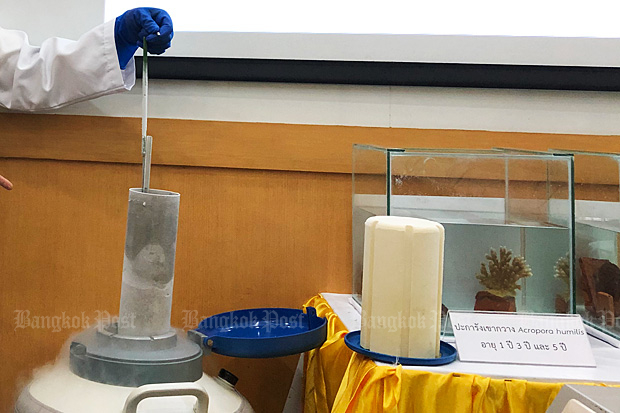
Marine scientists at Chulalongkorn University unveiled the world's first coral reef breeding method that utilises the frozen sperm cells of the finger staghorn coral.
The technique, perfected by marine biologists and researchers from the university's Department of Marine Science, utilises cryopreservation -- the use of very low temperatures to preserve living cells and tissues -- to keep sperm cells viable for future breeding programmes.
The technique was published in Cryobiology, an international journal of low-temperature biology and medicine, late last year.
"Coral reefs can breed naturally, but 'bleached' coral cannot produce enough eggs and sperm to successfully reproduce," Assoc Prof Suchana Chavanich from Chulalongkorn University's Department of Marine Science told the media on Wednesday.
"Using cryopreservation, we can collect and store sperm for future breeding programmes, whenever we see it appropriate."
Assoc Prof Suchana and his team conducted the study at the department's research facility on Chon Buri's Samae San island, where the sperm cells of Acropora humilis are stored at temperatures below -196 degrees Celsius.
Next, the research team will be looking at ways to freeze finger staghorn coral eggs, added Assoc Prof Suchana.
"Corals that are bred through cryopreservation have a survival rate of between 40-50% -- far higher than the 0.01% survival rate observed in nature," she said.
The department began its coral breeding project 19 years ago.
In 2006, the department's marine scientists successfully developed Thailand's first-ever coral cultivation programme with the support of the Plant Genetic Conservation Project under HRH Princess Maha Chakri Sirindhorn's royal initiative, the Navy's Special Naval Warfare Group, Akajima Marine Science Laboratory in Okinawa, Japan and Taiwan's National Museum of Marine Biology.
Corals are known to be particularly sensitive to environmental changes -- even a temperature increase of only 1C can lead to bleaching and mass deaths.
Rising sea temperatures and pollution are threatening Thailand's coral reefs, and marine scientists have been trying to find ways to help.
The most commonly used technique involves the use of artificial structures, such as concrete slabs, to anchor the corals' polyps so they can grow into adult corals.